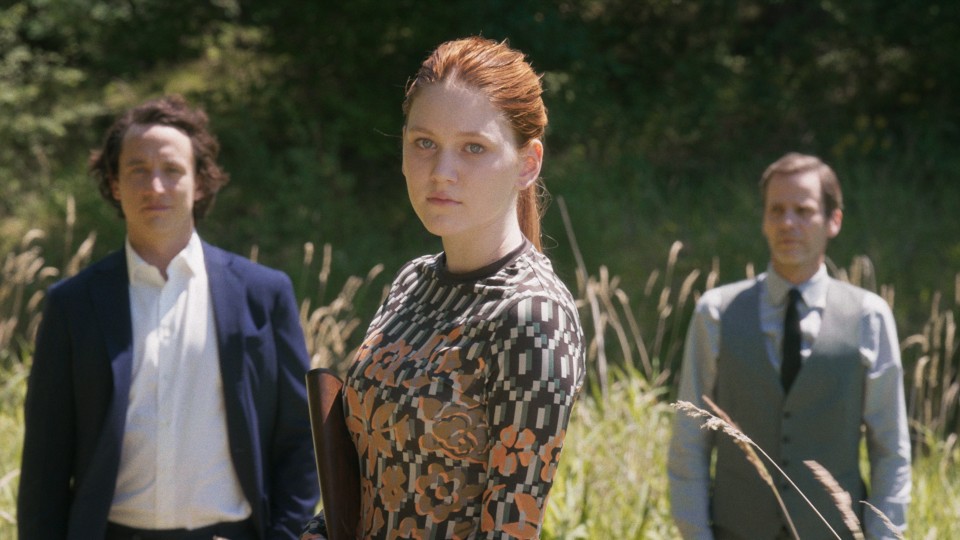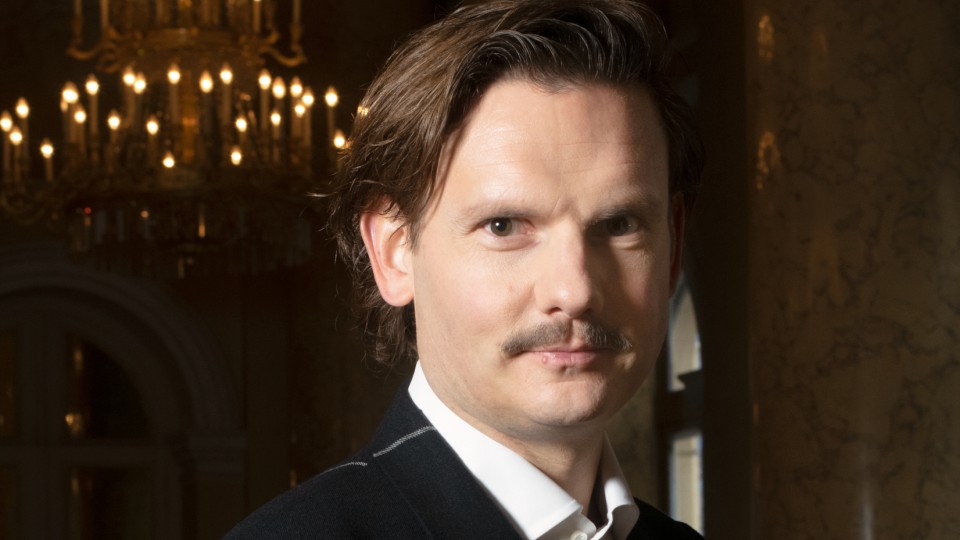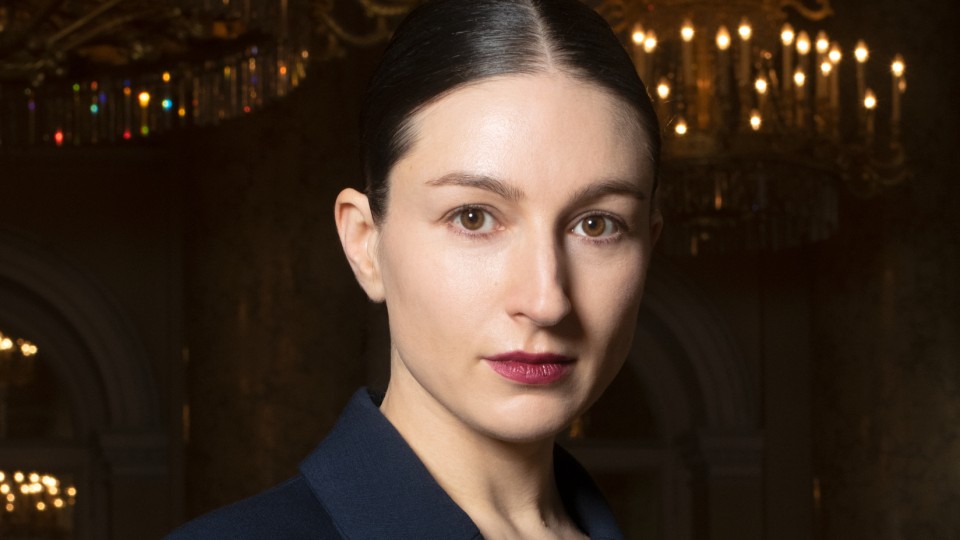In their cinematic works, Daniel Hoesl and Julia Niemann consistently focus attention on capital and the way its power derails
efforts to achieve social equality. Their protagonist in VENI VIDI VICI is an elegant billionaire, a devoted family man, a
cold-blooded killer. In the world he has created for himself, there is nothing to prevent him from maintaining a permanent,
shining appearance – because laws that apply to everyone have been suspended for him.
The themes of capitalism, its excesses and its winners continue to preoccupy you. Why is that?
DANIEL HOESL: Because we are the losers in this game, and because it is important to point out that if anything is to change, we’re the
ones who have to do it.
JULIA NIEMANN: We both grew up in working-class families, so money has always played a role for both of us. Everything has its price.
You place a quote from Ayn Rand at the beginning of the film: The point is, who will stop me. Who is this author? Did her works also provide impulses when you were writing the screenplay?
JULIA NIEMANN: Ayn Rand is the figurehead of neoliberal thinking in the United States. Her novels always feature extremely self-centred
characters who get away with it. One interesting point about her is that she died in poverty, alone in her apartment.
DANIEL HOESL: I found the interaction with the ideas of Austrian economist Joseph Schumpeter a more interesting element of the writing
phase. He coined terms such as entrepreneurship, disruption and creative destruction, which still dominate our economic life
today. He also wrote a book called Capitalism, Socialism and Democracy. In it, he asks himself the question: Do you think capitalism will survive? The answer is "no" because, in his view, capitalism
will devour itself if it isn’t regulated. In the chapter on socialism he also questions whether socialism will survive. And
the answer is "yes", because it is the only way of escaping the capitalism that devours itself. That's why there's the Schumpeter
plot in VENI VIDI VICI. This film definitely is about the question who IS going to stop these people? Who, if not us?
Recent events in Austria appear to reflect your concerns, with the bankruptcy of real estate giant Signa Holding. When you
started writing the screenplay were there any aspects of current affairs that inspired you to create the character of the
investor in VENI VIDI VICI?
DANIEL HOESL: I don't see René Benko (the founder of Signa Holding) as a good example. There are much more interesting people, such as
Nicolas Berggruen, the billionaire who inspired my film WinWin. And there are other billionaires who stand out, such as Elon Musk, who is "represented" insofar as our protagonist builds
the largest battery factory in Europe. The difference between a billionaire and a millionaire is that the billionaire isn’t
concerned with money anymore but purely with power and maintaining power. Their power is greater than that of states. It's
this excessive power that worries me. It’s an ethical issue when fewer and fewer people own more and more, while more and
more people own less and less.
Is satirical exaggeration the only formal approach that can take this reality to task?
DANIEL HOESL: The situation is serious. To create a parable, you have to exaggerate, paradoxically enough. I remember Donald Trump saying
he could shoot someone on Fifth Avenue, and it wouldn’t stop people voting for him.
How did you get to know the world of the super-rich?
JULIA NIEMANN: While we were researching for our film WinWin, we met an Austrian member of the super-rich. He received us in his villa. There was a huge work by Helnwein hanging in the
atrium, and in the background the nanny walked through the room with two children in princess costumes. Then the butler appeared,
holding two rifles. The proximity of idyllic family life and casual preparations for a hunt gave us some ideas for VENI VIDI
VICI. It was different from our previous films, where research was combined with the casting and the search for locations.
This time we had a different approach.
DANIEL HOESL: I've been dealing with the super-rich for twelve years, but at the same time I can never lose sight of my working-class origins.
The enjoyment I take in this work can definitely be traced back to the time when I did research for Ulrich Seidl, even though
I immersed myself in a completely different milieu with him. And I don't get bored with focusing on this 1% that provide the
simulacrum for our existence. They are revered as role models; we try to probe the very questionable attitude that "success
proves they are right".
From a dramaturgical point of view, Amon Maynard is the antithesis of the unlucky guy. Does this story, about a winner who
isn’t held back by fate or the law, also touch on the ethical conventions of storytelling?
JULIA NIEMANN: The film defies the Aristotelian narrative model which states that a character always has to go through catharsis in order
to become a better person. That's not how it is in reality, especially not for the super-rich.
DANIEL HOESL: It was always clear to me that our protagonist should almost despair because his transgressions do not have consequences –
an element of the project that was often not appreciated when we presented it, and people always wanted some catharsis. For
me, that was never an issue. I also believe that Aristotle is outmoded today, because catharsis is a fairy tale usually doesn’t
come true. Even after the bankruptcy involving billions, Benko himself is still a billionaire.
Your super-rich protagonist is a passionate family man. Is family the only social environment he needs?
JULIA NIEMANN: Originally, the film was to be called Vikings, because during their brutal campaigns the Vikings would plunder entire regions, burn everything to the ground and then enslave
the inhabitants. But afterwards they would return to their extended families, which were hugely important thing to them. That's
how our protagonist is: his family is the most important thing to him. His greatest concern is to pass on everything he has
to his descendants. The only moment when our all-powerful protagonist appears exposed and vulnerable is when his wife is in
danger of losing the baby.
Since casting didn’t go hand in hand with the research this time, how did you go about finding the main actors?
DANIEL HOESL: I knew for a long time that I wanted Ursina Lardi, because as a native of Graubünden she knows this world very well, especially
since she was in a relationship with a very wealthy man. And then our great casting director Martina Poel produced Laurence
Rupp from up her sleeve. We needed someone who was authentically appealing.
JULIA NIEMANN: I think sometimes it’s the most difficult thing to play a character who encounters hardly any problems, who is always on the
winning side, always in a good mood. There's not much you can get your teeth into as an actor. Laurence must have been looking
for some kind of conflict, some kind of psychology behind it. We denied him all that, which was definitely a challenge for
him. The big discovery we're particularly proud of is Olivia Goscher, who plays Paula. It was her first time in front of the
camera.
Depicting the world of the super-rich must also be a treat for set design and costume departments. How did you create this
world with what was probably a tight budget?
JULIA NIEMANN: Based on our years of research into the milieu of billionaires, we tried to portray their world the way it is. In terms of
appearance, it’s very different than with millionaires. They don't need to show off their wealth to the outside world. They
always live in understated style, so we tried to capture that element of retrained luxury in the film. At the same time, we
worked with our cinematographer Gerald Kerkletz on the visuals to strike a hyper-realistic tone. The sun is always shining
for the Maynards, and it does so in our film too.
The ending is rather pessimistic; neither fate nor the law contrive to give the Maynard family their just deserts. What does
that tell us when applied to our economic reality?
JULIA NIEMANN: VENI VIDI VICI is a wake-up call; it doesn't have a cynical "nothing will ever change" ending, but the conclusion is: If
something doesn't change soon, that's our reality. In fact, I can already see it. If we don't put a stop to the super-rich,
this could happen to any of us. Neither our working lives nor our most private family situations are protected from this.
Where do you see opportunities for action for the individual?
DANIEL HOESL: People have to stand up, get involved, formulate what they believe in. There are very rich people who themselves demand to
be taxed. The money must be made available to the public purse. It is unacceptable that the Social Democrats are opposed to
a wealth tax, that Austria is one of the few countries where there is no inheritance tax. Everyone knows all this, but no
one does anything about it. The most anyone can imagine is a strike by the trade unions. People always just want to keep the
status quo essentially the way it is, without thinking about the bigger picture. How can anyone claim that engaging in trade
will bring about peace? Especially when they trade with the worst dictators, like the Saudis or Vladimir Putin. If we don't
stand up and say "We won’t permit that!", then they'll walk all over us. We're the idiots who let it happen.
JULIA NIEMANN: The term “politics of envy” is very difficult in this context. I think this envy is productive: the anger that arises when
we see that even by working as hard as anyone possibly could, it’s impossible to achieve a certain standard of living that
others have. We need this anger in our society.
There does seem to be a certain hope in your words, though.
DANIEL HOESL: I do see hope, because a lot of rich people have also read this screenplay and said: "That's how it is." If you own a big
company, you already know the politicians who are dependent on you, because jobs must be created: so power begins at the municipal
level. Imagine the power of someone like Nikolaus Bergengruen, who used to own Burger King, among other things. We focus on
these issues because we have seen so many social dramas that haven’t done any good. Maybe films that invite compassion invite
less indignation than a cynical billionaire family.
Interview: Karin Schiefer
December 2023
Translation: Charles Osborne





